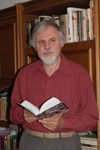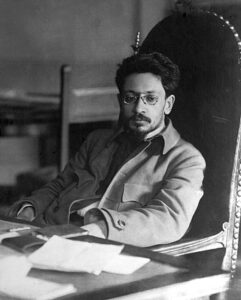By Alex Gordon


HAIFA, Israel — The Georgian Joseph Dzhugashvili, who took the pseudonym Stalin, was the sole and bloody ruler of the USSR for almost 30 years. Although millions of Soviet citizens were murdered during his rule, no one blamed the Georgian people for this heinous crime. Stalin would likely have lost the power struggle had it not been for the Spanish flu epidemic that killed Lenin’s most likely heir, Yakov Sverdlov, in 1919.
Yakov Sverdlov was born on June 3, 1885 in Nizhny Novgorod in a large Jewish family of a craftsman-engraver, owner of a printing shop. The family grew to six children, two daughters and four sons. Jewish issues were of little interest to Yakov. Later in one of his letters he reported: “I personally have never known national oppression, I have never been persecuted as a Jew.” Sverdlov was hardly telling the truth. In the 1890s there was a wave of anti-Jewish pogroms in Russia, which seized his city, Nizhny Novgorod, as well. According to a statement by the governor of Nizhny Novgorod, “The people were convinced of the complete impunity of the worst crimes, if only they were directed against the Jews.” Perhaps completely unaware of the purpose of his actions, at the age of 16 he joined the struggle against Tsarism, which cultivated antisemitism.
This professional Bolshevik revolutionary spent a total of more than 12 years in exile and prison. He was a member of the Central Committee of the Russian Bolshevik Social Democratic Party and the Russian Bolshevik Communist Party, one of the leaders of the October Revolution, Chairman of the All-Russian Central Executive Committee (the formal head of the country) in November 1917-March 1919 (until his death). In August-September 1918, after the assassination attempt on Lenin, Sverdlov was acting chairman of the Council of People’s Commissars, the country’s government. He was one of the leaders of the dispersal of the Constituent Assembly, Russia’s parliament, was at the origin of the Red Terror and authorized the execution of the last Russian emperor, Nicholas II.
Sverdlov completed four grades of the Nizhny Novgorod men’s gymnasium. This was the end of his formal studies, but in prison he engaged in self-education. In February 1913, together with Stalin he was extradited by the agent of the tsarist guards Malinovsky and exiled to Siberia. The exile they served for some time in the same house. In a letter dated March 12, 1914 Sverdlov recalled the life in exile with Stalin: “I am larger, he himself recognizes that. Theoretical questions cause little controversy. And there is not much interest in arguing with him, for I have a considerable advantage.”
Lenin needed a man who would take over the work of organizing and implementing the decisions taken. For this purpose, the Secretariat of the Central Committee of the Bolshevik Party headed by Sverdlov was created. November 29, 1917, the Central Committee of the Bolshevik Party created a quartet of leaders to address urgent issues, which included Sverdlov along with Lenin, Trotsky and Stalin.
In March 1918, Sverdlov’s authority began to grow rapidly. This is confirmed by the fact that it was in Sverdlov’s name that U.S. President Wilson sent a welcome telegram to the Congress of Soviets that opened in Moscow.
Trotsky recalled: “Until the spring of 1919, Sverdlov was the chief organizer of the party. He did not bear the title of general secretary, which at that time had not yet been invented at all. But he was one in deed.”
Sverdlov became the second man in the state after Lenin and concentrated enormous power in his hands. After the assassination attempt on Lenin on August 30, 1918, on September 2, Sverdlov signed the appeal of the All-Russian Central Executive Committee “on turning the Soviet Republic into a unified military camp,” supplemented on September 5 by the Council of People’s Commissars, which he headed during Lenin’s illness, with the Decree on Red Terror, which declared mass terror “against all enemies of the Revolution.”
In the article In Memory of Sverdlov, Trotsky wrote: “Sverdlov was short in stature, very thin, gaunt, brunet, with sharp features of a thin face. His strong, perhaps even mighty voice could seem inconsistent with the physical warehouse. To an even greater extent, however, this could be said of his character. But that could only be the impression at first. And then the physical appearance merged with the spiritual, and this short, thin figure, with a calm, unyielding will and a strong, but not flexible voice, appeared as a complete image. […] In the first post-October period, the enemies called the Communists, as we know, “leather” – by their clothes. I think that the example of Sverdlov played a great role in the introduction of the leather “uniform.” He himself, in any case, wore leather from head to toe, that is, from boots to leather cap. From him, as a central organizational figure, this clothing, which somehow corresponded to the character of the time, spread widely. […] In my memory the figure of Sverdlov remained in the garb of black leather armor – under the blows of the first years of the Civil War. He was a born organizer and combinator.”
Sverdlov, and after him all Soviet executioners, wore black leather clothes to match the color of their black deeds. Something infernal was seen in him. It was Sverdlov’s style that then began to spread among the Bolsheviks, becoming a symbol of the revolution. “The Black Devil of the Revolution,” as his political opponents called him, is often credited with playing a key role in the Bolsheviks’ most high-profile atrocities. He had colossal authority and a great advantage over Stalin. Had Sverdlov been alive, he would have become the General Secretary of the Bolshevik Party rather than Stalin. He would surely have been Lenin’s successor. If he, and not Stalin, had stood at the head of the USSR as the “red despot” and “black devil,” his crimes would have been attributed to the Jewish people. It is hard to imagine, but it is entirely possible that the Jewish people have had less misfortune thanks to Yakov Sverdlov’s death from Spanish flu.
*
Alex Gordon is professor emeritus of physics at the University of Haifa and at Oranim, the academic college of education, and the author of 10 books